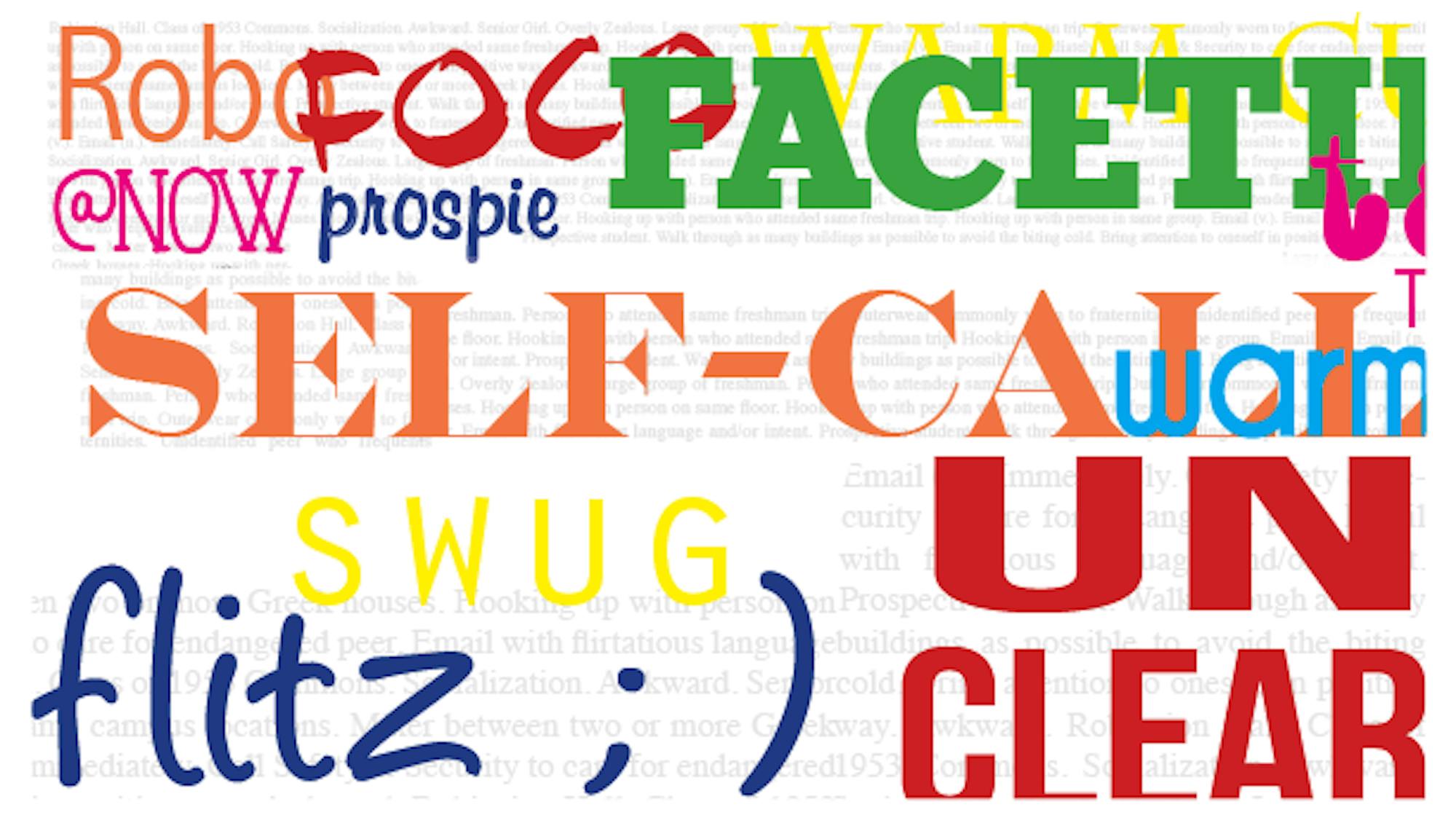We’ve all seen the diversity statistics on Dartmouth’s website, boasting that our peers come from 50 states and 79 countries. But with all those different backgrounds and cultures, why, when you look around, does everyone sound the same? You’d be hard-pressed to overhear a conversation that didn’t include at least one use of “facetime,” “schmob” or “FoCo.” But this trend goes beyond our quirky vocabulary. It’s not just what we say that’s strikingly similar, but also how we say it. Given Dartmouth’s diverse representation of countries and regions of the U.S., we’re forced to wonder — where is the linguistic diversity?
We’re not the only ones asking this question. A whole field of study is dedicated to answering it — sociolinguistics — and linguistics professor James Stanford teaches a class on the subject. Although sociolinguistics, which focuses on the relationship between language in society and the construction of social identity, has various applications, one of its focuses, called dialect levelling, appears all over our campus.
Stanford defines dialect levelling as “the tendency to speak in a regional standard and level out linguistic features that are regionally distinctive, stigmatized or mark a group feature.”
In other words, it’s when students abandon their native accent or speaking style to match the predominant sound. Is this phenomenon a voluntary choice, or a natural, subconscious inevitability? The answer — it all depends.
Stanford said one reason people use similar patterns of speech, sometimes dropping their former accents, is “to express solidarity with others and to construct their own identity.”
It’s a normal pattern of human behavior, he said, to try and blend in with those around us.
Lota Ezenwa ’17, who was born in London and moved to Tulsa, Oklahoma, at 4 years old, gradually and subconsciously replaced his British accent with an American one. It wasn’t until he was 7, when a visiting aunt asked him where his accent had gone, that he realized he had ever had one. Although he lost his British accent unintentionally, Ezenwa said he actively rejected adopting a Southern drawl to avoid any negative connotations associated with the accent.
“Why give someone a reason to assume you’re unintelligent?” Ezenwa asked.
A neutral accent, Enzenwa said, “allows people to experience who you are, rather than what you sound like.”
Ezenwa said he remembered starting to pick up words like ‘y’all’ and stressing different syllables in new ways that typically signal a Southern accent.
“I realized what I was doing consciously, and I was like ‘why am I doing that?’” he said. “I remember doing it because I wanted to sound like everyone else, but I was kind of like, I don’t really care if I sound like everyone else.”
According to Stanford, Ezenwa is not the only one whose accent — or lack thereof — needed to be pointed out to him.
“Oftentimes people don’t realize they have a strong accent until they come to Dartmouth,” Stanford said. “They don’t realize that their accent could be stigmatized or perceived negatively because it’s all they have ever heard — it’s below their level of conscious awareness.”
Sometimes when students come to Dartmouth, he said, they are teased for their accents and become self-conscious of their speech patterns, which causes them to make an active choice to change the way they speak.
These were the very factors that led Emily Harwell ’16, an Oklahoma native, to ditch her own accent. Harwell didn’t recognize that she had such a distinct dialect until she got to Dartmouth, where friends found it funny.
“I didn’t want to sound like a Southern hick, as I thought I did, and I wanted to sound more educated,” Harwell said. “To do so, I erased my accent almost completely here.”
Harwell said that despite her desire to erase her Southern drawl, she sometimes says certain words with an accent.
“When I say the word “been,” for example, it sometimes sounds like I’m saying “bin” — but I consciously try to avoid it,” she said.
Stanford’s research addresses the prejudice and negative connotations associated with distinctive styles of speaking.
“Some dialects are perceived as more prestigious — if one group is dominant in the world, for example, their dialect is perceived as better,” he said. “Conversely, concerning the principle of linguistics subordination, if a group has a lower social status, their way of speaking will consequently be viewed as inferior.”
At Dartmouth, an Ivy League college and a Mecca of education and intellectualism, the question of suppressing an accent goes beyond social discomfort and digs into deeper questions of class, race and social power. It’s no wonder, then, that students abandon accents that would flag them as different compared to the standard, and in particular, as socially or intellectually less-than.
Harwell’s situation illuminates both sides of the issue. On the one hand, she suppresses her natural twang to seem smarter and fit in on campus. But back in Oklahoma, her family makes fun of her for speaking without her natural accent, Harwell said. They think “that going to college on the East Coast has made me a little uppity,” she added.
Other social factors also play a role in students’ decisions to alter their speaking style. For Steph Abbott-Grobicki ’15, speech changes are a matter of convenience. Abbott-Grobicki, who was born in London and lived in South Africa, Poland and France before attending an international high school, describes her accent as “transatlantic.”
“My accent is weird wherever I go,” she said. “Because I’m not native to anywhere, my accent is not native to anywhere.”
Abbott-Grobicki said that friends often find her accent funny, and joke about her pronunciation or vocabulary differences. Unshockingly, by the third or fourth time per day, the jokes get old. It can also get frustrating, Abbott-Grobicki said, to have to repeat or explain things multiple times, which is why, talking to people on the day-to-day, she tries to sound more American.
“I wouldn’t normally say ‘tomatoe,’” Abbott-Grobicki said. “I have to think about it. I’d say ‘to-mah-to.’ If I’m tired, my brain doesn’t think about those things as much and my accent comes out more.”
Tsion Abera ’17, who is originally from Ethiopia but moved to London and then to Washington, D.C., also encountered difficulty in speaking with what she describes as “urban vernacular.”
“My freshmen trip was with all international students, so I initially felt very comfortable,” Abera said. But things changed when the rest of the students from the U.S. arrived on campus. “People weren’t understanding me and seemed very confused. I felt like the way I was speaking was inappropriate for Dartmouth, and I became very tired of explaining myself.”
Abera describes her decision to adapt her language as the result of social pressure.
“It was not exactly a willful choice, but it was conscious,” she said. “It became an aspect of culture conformity.”
Stanford says Dartmouth is “typical of any supra-regional university, as it draws people from all over the country and world.”
The accent-dropping, he said, is neither unique nor bad.
“I think it actually reflects the strength of Dartmouth’s diversity, as it shows we have students with all different backgrounds,” Stanford said.
On a technical linguistic level, this might be the case. For Abera, however, the change is less about assimilation to Dartmouth’s culture and more about losing touch with her own.
“I felt like my vernacular expressed my black identity,” she said. “Having to change my way of speaking made me feel like I was too black, like I didn’t really belong here. I changed because I wanted to meet people halfway.”
It seems she’s not alone. The students we spoke to didn’t simply slip into neutral accents. They made active choices to alter their vocabulary and pronunciation to avoid negative judgement and feeling noticeably different.
But it doesn’t have to be that way.
Since originally altering her self-expression, Abera says that she has come to care less about what people might think and is gradually reverting back to her old way of speaking.
“If people don’t understand something I said,” Abera said. “They can Google it.”
We’re listening, and we’re hoping others will follow your lead. Our smartphones are at the ready.




